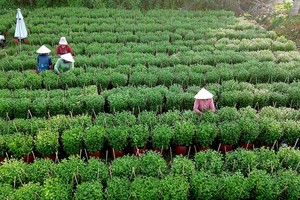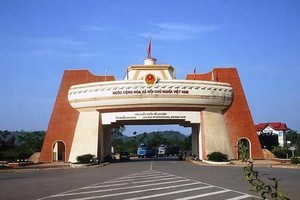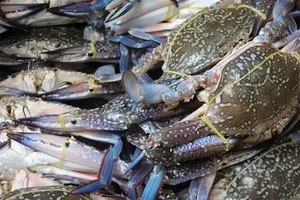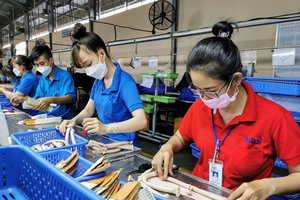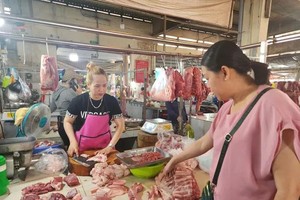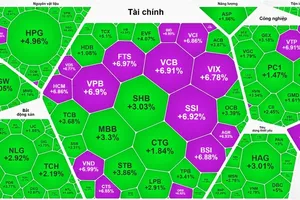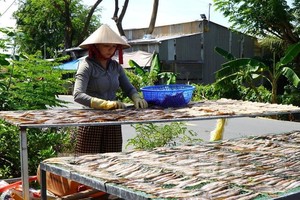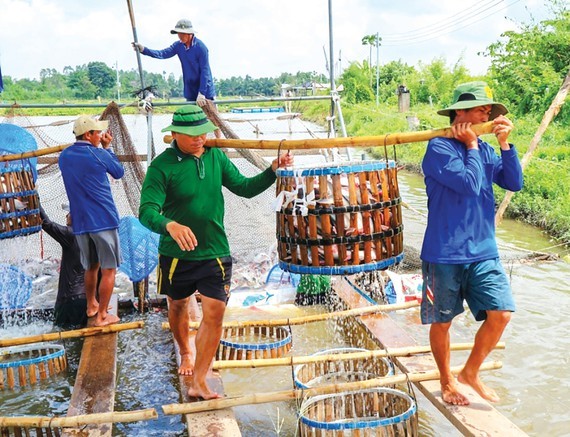
Currently, material pangasius fish have passed the harvest date but they are unsalable. Moreover, severe saltwater intrusion in the Mekong Delta provinces has made pangasius fish sick.
For a whole month, many fish-farming households in the Mekong Delta have been looking for buyers as the price of pangasius fish is declining lower and lower but consumption is difficult.
Mr. Le Quang Vinh, a farmer who raises pangasius fish in a two-hectare pond in Vinh Hanh Commune in Chau Thanh District in An Giang Province, lamented that normally when pangasius fish reach a weight from 0.8 kilograms to 1 kilogram per fish, they will be harvested to sell to export processing plants. His fish have been raised for more than ten months, causing their weight to touch 1.8 kilograms per fish but there were no buyers. He had to ask everywhere then found a plant that agreed to buy his fishes for VND17,700-VND18,000 per kilogram but on credit. With such price level, he lost an average of VND5,000-VND6,500 per kilogram.
In the same situation, Mr. Nguyen Van Tan, a farmer in Chau Phu District in An Giang Province, said that his more than 260 tons of pangasius fish were bought at VND18,300 per kilogram, causing him to lose more than VND1.3 billion.
According to the Department of Fisheries of An Giang Province, every year, farmers in the province raise around 1,226 hectares of pangasius fish with a production of 430,000 tons. Since the beginning of this year, farmers have raised nearly 930 hectares of pangasius fish but low price levels have caused difficulties for farmers.
In Dong Thap and Vinh Long provinces, many fish-farming households are on pins and needles as the price of pangasius fish fell drastically. ‘Currently, if pangasius fish is qualified, enterprises only buy at as much as VND18,500-VND19,000 per kilogram while the cost price is not lower than VND22,000 per kilogram. However, most enterprises buy fish on credit. So farmers have to suffer many difficulties,’ Mr. Nguyen Thanh Binh, Director of Chau Thanh Seafood Production and Service Cooperative in Dong Thap Province, concerned.
Along with a decreasing price and poor consumption, many fish-farming households in Ben Tre, Tra Vinh, and Tien Giang provinces also have to face with saltwater intrusion. Mr. Nguyen Van Dao, Chairman of Go Dang Seafood Company in Tien Giang Province, said that saltwater intrusion was early this year. It would last for a long time and maintain at high levels. Many rivers in Ben Tre, Tra Vinh, and Tien Giang provinces had salinity levels ranging from 4 per mille to 25 per mille, causing lots of pangasius fish to be dead.
The People’s Committee of Ben Tre Province said that saltwater intrusion has made 22 hectares of farmed pangasius fish in Thanh Phu Dong Commune lose 3-4 percent. moreover, 214 hectares of pangasius fish in Mo Cay Nam and Giong Trom districts were affected.
Mr. Duong Nghia Quoc, Chairman of the Vietnam Pangasius Association, said that Vietnam’s pangasius fish exports exceeded US$2 billion last year, down 11.4 percent compared to the same period last year as the farming area in the Mekong Delta increased but the export markets were difficult, leading to a low value. Since the beginning of this year, the export of pangasius fish has been facing new challenges when an acute respiratory illness caused by the new coronavirus has spread to several countries in the world. Complicated developments of the disease in many European and Asian countries have added more difficulties to the consumption of pangasius fish in the future. If the country does not have an effective and reasonable solution immediately, the export goal of around $2.2 billion of pangasius fish will not be feasible.
Mr. Nguyen Duy Nhut, Deputy CEO of Nam Viet Joint Stock Company in An Giang Province, said that many export enterprises have been reduced production by 30-40 percent, leading to high inventory, more costs for preservation, unrecoverable working capital, and ineffective business performance. Pangasius enterprises are surrounded by difficulties. Along with market solutions, authorities need to promptly implement tax reduction and tax exemption for pangasius export enterprises, simplify administrative procedures, and not to inspect these enterprises during this time. Banks should lower debts and interest rates to share difficulties with export enterprises.
Despite several challenges, many enterprises in the Mekong Delta still maintain their operations to ensure jobs for workers, at the same time showing the experience, the skill, and the spirit to overcome difficulties of Vietnam’s pangasius industry. The business community needs to unite, along with the support of associations and authorities in terms of mechanism, policies, and capital, to quickly help the pangasius industry to stabilize its production and export.
According to the Vietnam Pangasius Association, export turnover of pangasius fish to the US reached more than $18.1 million in January this year, down 55 percent compared to the same period last year but accounted for 17.8 percent of the total exports, the highest compared to other markets. However, the industry cannot expect too much in the US market but need to carry out measures synchronously in an attempt to maintain traditional markets, expand new markets, and increase consumption in the domestic market.
For a whole month, many fish-farming households in the Mekong Delta have been looking for buyers as the price of pangasius fish is declining lower and lower but consumption is difficult.
Mr. Le Quang Vinh, a farmer who raises pangasius fish in a two-hectare pond in Vinh Hanh Commune in Chau Thanh District in An Giang Province, lamented that normally when pangasius fish reach a weight from 0.8 kilograms to 1 kilogram per fish, they will be harvested to sell to export processing plants. His fish have been raised for more than ten months, causing their weight to touch 1.8 kilograms per fish but there were no buyers. He had to ask everywhere then found a plant that agreed to buy his fishes for VND17,700-VND18,000 per kilogram but on credit. With such price level, he lost an average of VND5,000-VND6,500 per kilogram.
In the same situation, Mr. Nguyen Van Tan, a farmer in Chau Phu District in An Giang Province, said that his more than 260 tons of pangasius fish were bought at VND18,300 per kilogram, causing him to lose more than VND1.3 billion.
According to the Department of Fisheries of An Giang Province, every year, farmers in the province raise around 1,226 hectares of pangasius fish with a production of 430,000 tons. Since the beginning of this year, farmers have raised nearly 930 hectares of pangasius fish but low price levels have caused difficulties for farmers.
In Dong Thap and Vinh Long provinces, many fish-farming households are on pins and needles as the price of pangasius fish fell drastically. ‘Currently, if pangasius fish is qualified, enterprises only buy at as much as VND18,500-VND19,000 per kilogram while the cost price is not lower than VND22,000 per kilogram. However, most enterprises buy fish on credit. So farmers have to suffer many difficulties,’ Mr. Nguyen Thanh Binh, Director of Chau Thanh Seafood Production and Service Cooperative in Dong Thap Province, concerned.
Along with a decreasing price and poor consumption, many fish-farming households in Ben Tre, Tra Vinh, and Tien Giang provinces also have to face with saltwater intrusion. Mr. Nguyen Van Dao, Chairman of Go Dang Seafood Company in Tien Giang Province, said that saltwater intrusion was early this year. It would last for a long time and maintain at high levels. Many rivers in Ben Tre, Tra Vinh, and Tien Giang provinces had salinity levels ranging from 4 per mille to 25 per mille, causing lots of pangasius fish to be dead.
The People’s Committee of Ben Tre Province said that saltwater intrusion has made 22 hectares of farmed pangasius fish in Thanh Phu Dong Commune lose 3-4 percent. moreover, 214 hectares of pangasius fish in Mo Cay Nam and Giong Trom districts were affected.
Mr. Duong Nghia Quoc, Chairman of the Vietnam Pangasius Association, said that Vietnam’s pangasius fish exports exceeded US$2 billion last year, down 11.4 percent compared to the same period last year as the farming area in the Mekong Delta increased but the export markets were difficult, leading to a low value. Since the beginning of this year, the export of pangasius fish has been facing new challenges when an acute respiratory illness caused by the new coronavirus has spread to several countries in the world. Complicated developments of the disease in many European and Asian countries have added more difficulties to the consumption of pangasius fish in the future. If the country does not have an effective and reasonable solution immediately, the export goal of around $2.2 billion of pangasius fish will not be feasible.
Mr. Nguyen Duy Nhut, Deputy CEO of Nam Viet Joint Stock Company in An Giang Province, said that many export enterprises have been reduced production by 30-40 percent, leading to high inventory, more costs for preservation, unrecoverable working capital, and ineffective business performance. Pangasius enterprises are surrounded by difficulties. Along with market solutions, authorities need to promptly implement tax reduction and tax exemption for pangasius export enterprises, simplify administrative procedures, and not to inspect these enterprises during this time. Banks should lower debts and interest rates to share difficulties with export enterprises.
Despite several challenges, many enterprises in the Mekong Delta still maintain their operations to ensure jobs for workers, at the same time showing the experience, the skill, and the spirit to overcome difficulties of Vietnam’s pangasius industry. The business community needs to unite, along with the support of associations and authorities in terms of mechanism, policies, and capital, to quickly help the pangasius industry to stabilize its production and export.
According to the Vietnam Pangasius Association, export turnover of pangasius fish to the US reached more than $18.1 million in January this year, down 55 percent compared to the same period last year but accounted for 17.8 percent of the total exports, the highest compared to other markets. However, the industry cannot expect too much in the US market but need to carry out measures synchronously in an attempt to maintain traditional markets, expand new markets, and increase consumption in the domestic market.


